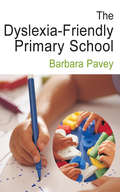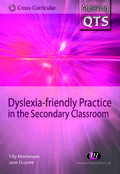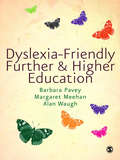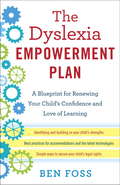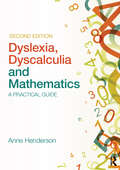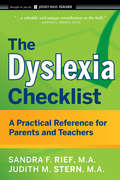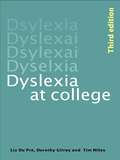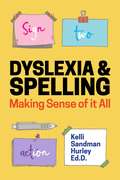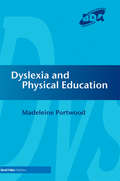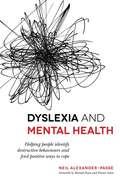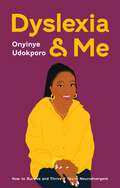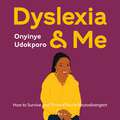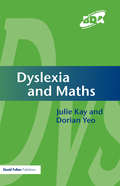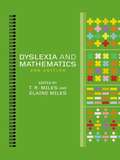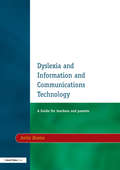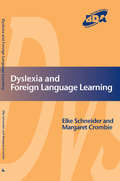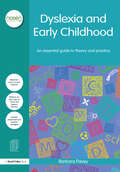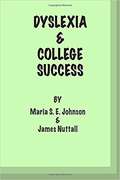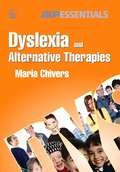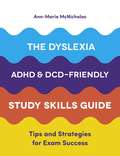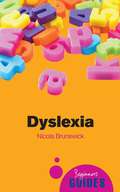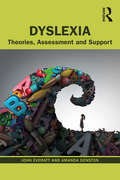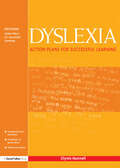- Table View
- List View
The Dyslexia-Friendly Primary School: A Practical Guide for Teachers
by Barbara PaveyIs your school dyslexia-friendly? Beginning with a look at understanding dyslexia, this book shows you how to involve the whole school in order to achieve a dyslexia-friendly environment. You will be able to: - use an audit tool to discover how dyslexia-friendly your school is - look at examples of successful dyslexia-friendly initiatives - find information on funding and resources. This book offers a step-by-step guide to creating a dyslexia-friendly classroom and whole-school environment. Headteachers, deputy headteachers, class teachers, SENCOs, student teachers and literacy co-ordinators wanting to make their school more dyslexia-friendly will find this practical book extremely useful. Barbara Pavey worked as a teacher and SEN specialist for many years and is now Lecturer in Learning Disabilities at The University of Manchester.
Dyslexia-friendly Practice in the Secondary Classroom (Achieving Qts Cross-curricular Strand Ser.)
by Tilly Mortimore Jane DupreeThe first guide of its kind written specifically for trainee and newly qualified teachers, this standards-based text explores the needs of dyslexic learners in mainstream secondary schools. In light of the current dyslexia-friendly schools initiative, it looks at organisational-level support for dyslexic children, together with pragmatic strategies which teachers can use to support children's cross-curricular learning. Further, it includes case studies and practical tasks to build readers' confidence in supporting Specific Learning Difficulties, as well as a range of coping strategies and practical advice, based upon the authors' experience of working with dyslexic learners in different contexts over many years.
Dyslexia-Friendly Further and Higher Education
by Barbara Pavey Margaret Meehan Alan WaughWritten by authors with extensive experience of working with students with dyslexia, this book provides clear guidance and practical strategies for dyslexia-friendly practice for those working with young people aged 14 to 19 and adults in education or work-based training. Looking at how dyslexia impacts on learning, the authors suggest ways to improve the learning environment and explain how to help students develop the basic skills that will help them to make the transition from study to employment. Building on the latest research and understanding of dyslexia, they also consider overlapping characteristics, emotional and social issues and funding. The book includes: - visual chapter summaries - case studies drawn from practice - ideas for dyslexia-friendly written work, and lab and bench work - international perspectives - a selection of resources - model lesson plans and useful checklists This is essential reading not only for those studying dyslexia-focused programmes at Master's level, but also for mainstream practitioners wishing to improve their dyslexia knowledge and practice, and an ideal resource for professionals working in a school, college, university or adult setting, or delivering training and consultancy in this field. Barbara Pavey is a Senior Lecturer in Education at York St John University. Margaret Meehan is the Dyslexia Coordinator at Swansea University. Alan Waugh is Programme Area Manager for Additional Support at City College, Coventry.
The Dyslexia Empowerment Plan
by Ben FossFinally, a groundbreaking book that reveals what your dyslexic child is experiencing--and what you can do so that he or she will thrive More than thirty million people in the United States are dyslexic--a brain-based genetic trait, often labeled as a "learning disability" or "learning difference," that makes interpreting text and reading difficult. Yet even though children with dyslexia may have trouble reading, they don't have any problems learning; dyslexia has nothing to do with a lack of intellect. While other books tell you what dyslexia is, this book tells you what to do. Dyslexics' innate skills, which may include verbal, social, spatial, kinesthetic, visual, mathematical, or musical abilities, are their unique key to acquiring knowledge. Figuring out where their individual strengths lie, and then harnessing these skills, offers an entrée into learning and excelling. And by keeping the focus on learning, not on standard reading the same way everyone else does, a child with dyslexia can and will develop the self-confidence to flourish in the classroom and beyond. After years of battling with a school system that did not understand his dyslexia and the shame that accompanied it, renowned activist and entrepreneur Ben Foss is not only open about his dyslexia, he is proud of it. In The Dyslexia Empowerment Plan he shares his personal triumphs and failures so that you can learn from his experiences, and provides a three-step approach for success: * Identify your child's profile: By mapping your child's strengths and weaknesses and assisting her to better understand who she is, you can help your child move away from shame and feelings of inadequacy and move toward creating a powerful program for learning. * Help your child help himself: Coach your child to become his own best advocate by developing resiliency, confidence, and self-awareness, and focusing on achievable goals in areas that matter most to him. * Create community: Dyslexic children are not broken, but too often the system designed to educate them is. Dare to change your school so that your child has the resources to thrive. Understanding your rights and finding allies will make you and your child feel connected and no longer alone. Packed with practical ideas and strategies dyslexic children need for excelling in school and in life, this empowering guide provides the framework for charting a future for your child that is bright with hope and unlimited potential.Advance praise for The Dyslexia Empowerment Plan "I study dyslexia in the lab and am a parent of a wonderful daughter who fits this profile. Ben Foss's book should be considered essential to any collection on the subject. It was extremely useful, especially for a mom. Thank you!"--Maria Luisa Gorno Tempini, M.D., Ph.D., professor of neurology, UCSF, Memory and Aging Center "As someone with a learning profile that made school tough, and as a parent, I know kids need the right support. Ben Foss knows how to get access to education because he's been through it. I was thrilled to read this book. It offers a wise collection of insights that are both practical and touching. Buy it today if you want a get a plan for your child."--James Gandolfini, actor, The Sopranos
Dyslexia, Dyscalculia and Mathematics: A practical guide
by Anne HendersonDyslexia, Dyscalculia and Mathematics will be an essential resource for teachers, classroom assistants, and SENCOs who help dyslexic and dyscalculic children with their understanding of mathematics. Written in an accessible style with helpful illustrations, this practical book reveals helpful ways in which to tackle both simple and complex concepts with students of all ages. This second edition has been updated to include references to using technology that will help children with dyslexia and dyscalculia reinforce their mathematical skills and also contains a number of photocopiable resources that can be used in the classroom. Written by Anne Henderson, who is experienced in teaching language and mathematics to pupils with dyslexia and dyscalculia, this book outlines current thinking in the field and shows how the research methods that have been proven as successful can be used with whole classes of children. This book encourages flexible methods and gives teachers the confidence to discuss alternative solutions with their pupils and help them achieve success. It is an ideal handbook for parent-teacher programmes and is also suitable for in-service training.
The Dyslexia Checklist
by Judith Stern M.A. Sandra F. RiefEssential advice and resources for helping kids with dyslexiaThe Dyslexia Checklist is a valuable guide for parents and teachers that can help them better understand children and teenagers with dyslexia and other reading- and language-based disabilities. The book relays the most current research available and is filled with practical strategies, supports, and interventions. Using these tools teachers and parents can accommodate the needs and strengthen the skills of students with reading and writing disabilities across all age levels. The book is presented in a simple, concise, easy-to-read checklist format and is filled with useful advice and information on a wide range of topics.Explains what we now know about dyslexia from decades of researchContains games to strengthen a child's literacy and language skillsProvides important information for hooking in reluctant and struggling readersOffers suggestions for enhancing skills in vocabulary, comprehension, composition and written expression, spelling, math, and moreThe book also provides information on the educational rights of students with dyslexia.
Dyslexia at College
by T. R. Miles Dorothy Gilroy Elizabeth Ann Du PreThis fully updated third edition contains practical and useful advice that will be invaluable for students with dyslexia, their parents and all of those involved in teaching and supporting them in their studies. Including the latest research into dyslexia, changes in legislation and information technology and the real-life experiences of six former Bangor students this book will: • guide students through the process of applying for university, suggesting strategies for general organisation and for particular aspects of study • outline how to get the best personally and academically from higher education • give practical advice on setting up and using support facilities (both human and technological) • be an accessible text for mainstream lecturers and tutors who need to be aware of the implications of the Disability Discrimination Act. New chapters include 'Dyslexia plus', giving information on dyspraxia, attention disorders, Asperger's syndrome, and the more controversial 'dyscalculia'. ‘Out of College and into Work’ gives advice for students on the challenges they face after graduation.
Dyslexia and Spelling: Making Sense of It All
by Kelli Sandman-HurleyWritten by an authority in the dyslexia field, this is the first accessible guide to the close interplay of spelling and dyslexia. Kelli Sandman-Hurley talks the teacher or parent through why kids with dyslexia find spelling so hard, and what we can learn from the spelling mistakes in their writing samples. Introducing key terminology around morphemes (smallest unit of meaning in words) and phonemes (smallest contrastive units in language) in an accessible and clear way, Sandman-Hurley goes on to explain how we can identify, and learn from, kids' spelling miscues, and use them to further inform our teaching and instruction. Shedding much-needed light on an under-explored tool for classroom or home learning, Dyslexia and Spelling is essential reading for teachers and parents alike.
Dyslexia and Physical Education
by Madeleine PortwoodMuch research has focused on dyslexia and co-ordination. This book examines the literature and provides a framework to support pupils with dyslexia, not only during PE lessons but in less structured environments, for example during break time when pupils are likely to be involved in physical activities.
Dyslexia and Mental Health: Helping people identify destructive behaviours and find positive ways to cope
by Pennie Aston Neil Alexander-Passe Michael RyanDyslexia is a complex condition that affects not only learning but every part of life. Experience or fear of social stigma can lead people with dyslexia to camouflage the difficulties they face, to withdraw and to adopt negative coping strategies, particularly if they lack adequate support, identification and intervention. This can have lasting impact on their emotional health. Neil Alexander-Passe is an experienced researcher and a special needs teacher in secondary mainstream education. He also has dyslexia. Neil uses his personal and professional experience to shed light on the complexities surrounding dyslexia and examines psychological theories such as ego-defence mechanisms and learned helplessness that reveal how people deal with its emotional impact. He offers guidelines and advice, illustrated with real life examples, about how to help people with dyslexia avoid harmful coping strategies and learn to deal with stress, anxiety and low self-esteem in more effective and psychologically positive ways. This book will help educational and clinical psychologists, teachers, mental health specialists, counsellors and therapists understand the emotional complexities of dyslexia.
Dyslexia and Me: How to Survive and Thrive if You’re Neurodivergent
by Onyinye UdokporoThroughout my life I have been told directly and indirectly that dyslexia is found in particular people... [In fact] dyslexia can be found in someone like me. It isn't just 'okay' but something to be proud of. This book has been written because I want people to know that dyslexia can be found in people of every colour, creed, or circumstance.In this book, rising star entrepreneur Onyinye Udokporo shares her story of growing up dyslexic in a society where neurodivergence was always presented as a white male issue.Onyinye discusses her experience of being diagnosed at 11 years old, starting a business the following year, gaining a scholarship to a prestigious boarding school and going on to complete two degrees by the age of 22, while also being honest about the difficulties she faced throughout including with bullying and anxiety. She shares the tips she picked up over the years for thriving with dyslexia and the strategies she used to overcome her difficulties in reading and writing well, staying organised and speaking with confidence.Illuminating wider issues of systemic racism in the educational sector and providing a timely reminder that dyslexia can be found in any community and culture, this is an empowering story of surviving and thriving in the face of adversity.
Dyslexia and Me: How to Survive and Thrive if You’re Neurodivergent
by Onyinye UdokporoThroughout my life I have been told directly and indirectly that dyslexia is found in particular people... [In fact] dyslexia can be found in someone like me. It isn't just 'okay' but something to be proud of. This book has been written because I want people to know that dyslexia can be found in people of every colour, creed, or circumstance.A survival guide on being young and dyslexic by inspiring rising star entrepreneur and speaker Onyinye Udokporo, combining her own personal story with political and cultural insights, and practical tips and advice.In this audiobook, rising star entrepreneur Onyinye Udokporo shares her story of growing up dyslexic in a society where neurodivergence was always presented as a white male issue.Onyinye discusses her experience of being diagnosed at 11 years old, starting a business the following year, gaining a scholarship to a prestigious boarding school and going on to complete two degrees by the age of 22, while also being honest about the difficulties she faced throughout including with bullying and anxiety. She shares the tips she picked up over the years for thriving with dyslexia and the strategies she used to overcome her difficulties in reading and writing well, staying organised and speaking with confidence.Illuminating wider issues of systemic racism in the educational sector and providing a timely reminder that dyslexia can be found in any community and culture, this is an empowering story of surviving and thriving in the face of adversity. (P) 2022 Jessica Kingsley Publishers
Dyslexia and Maths
by Dorian Yeo Julie KayThis concise text helps the reader to understand why dyslexics find maths difficult and offers practical ideas for supporting them most effectively. It explains which areas of maths dyslexics tend to have particular difficulty with, assesses current teaching philosophies and methods, describes a framework of general learning principles that allow dyslexics to make progress in maths, and outlines a number of specific and effective teaching recommendations. The book helps teachers at primary and secondary levels to better understand the maths performance of dyslexics and gives them an overview of the ways in which dyslexics can best be supported in all aspects of maths learning.
Dyslexia and Mathematics
by Elaine Miles T. R. MilesIn this revised and fully updated second edition of the classic bestselling text, the formidable team of expert contributors, inluding Professor Tim Miles OBE, draw on their extensive experience in the field. The outcome is a wealth of material based on individual case studies supported by practical and accessible teaching strategies. The new material includes: * discussion of the latest thinking in the field - ideas on dyscalculia* information from a survey of primary school children* guidance on suitable testing material* innovative contributions on practice. The long awaited second edition of Dyslexia and Mathematics is unique in terms of its coverage and authority, and is a must-buy text for teachers, student teachers and special needs co-ordinators.
Dyslexia and Information and Communications Technology: A Guide for Teachers and Parents
by Anita KeatesEffective use of ICT can enhance many dyslexic pupils' access to the curriculum, but it has to be used appropriately. This book will be useful to all teachers, teaching assistants, SENCOs and parents who are keen to have practical advice on how to help a child in this way. Full of strategies and suggestions that are based on the author's extensive classroom experience, this accessible book is suitable for the ICT novice and more advanced user alike. The book has been fully updated to guide the user through the maze of hardware and software currently available, identifying those most suitable for different Key Stages and curriculum subjects as well as providing ICT solutions to the problems of assessing and screening for dyslexia.
Dyslexia and Foreign Language Learning
by Elke Schneider Margaret CrombieOffering strategies and techniques for teaching modern foreign languages - an often severely challenging subject for pupils with dyslexia - this book is specifically designed to meet the needs of the busy subject specialist teacher looking for guidance on supporting pupils.
Dyslexia and Early Childhood: An essential guide to theory and practice (nasen spotlight)
by Barbara E. PaveyTaking a developmental approach, this accessible text addresses the ever increasing interest in identifying the characteristics of dyslexia in young children and reflects on the best way to reach and support these learners. Drawing upon current research, the author considers our current understanding of dyslexia and calls upon best practice to advise professionals, students and family members alike who seek to fulfil the potential of young children with, or showing the signs of, dyslexia. This book considers key topics explored in current best practice and dyslexia research, including: the importance of the role of speaking, hearing and understanding language dyslexia in relation to other languages and orthographies dyslexia and overlapping characteristics, particularly dyspraxia the role of play identifying and assessing dyslexia in the early years. Adopting a dyslexia-friendly position, Barbara Pavey acknowledges the ethics associated with a social model of disability, so that the focus is upon modifying teaching and learning, and respecting the views of children and parents throughout. This book includes assessment and practice strategies, good practice points, helpful ideas, first-hand narratives of dyslexia, pointers for further reading, resources and online tools, and will be of enormous practical use to anyone supporting a young child with potential or diagnosed dyslexia.
Dyslexia and College Success
by Maria S.E. Johnson James NuttallWritten by two individuals with dyslexia and dysgraphia who have successfully navigated the college experience, it provides a unique first hand perspective on attending college with these limitations.
Dyslexia and Alternative Therapies
by Maria Chivers'A good book about how alternative therapies can help dyslexia. It mentions each therapy individually and explains what it is, how it works, how many sessions are needed, who will benefit, and if it can be done at home.' - Education Otherwise This comprehensive book offers clear and balanced information on a range of alternative therapies for individuals with dyslexia, dyscalculia, dyspraxia or ADHD. The author provides an overview of each therapeutic option, method of use and case examples, covering nutritional supplements, massage, acupuncture and hypnotherapy, among others. She also includes contributions from experienced alternative therapists, offering an insider's view of what works and what does not. Her objective approach will enable the reader to make an informed choice from among the many available options. A bibliography and a list of useful contacts are also provided. This book is a key resource for anyone interested in exploring alternative therapy approaches to dyslexia and related difficulties, particularly for parents of people with dyslexia, dyslexics themselves and the professionals who work with them.
The Dyslexia, ADHD, and DCD-Friendly Study Skills Guide: Tips and Strategies for Exam Success
by Ann-Marie McNicholasThis practical skills guide helps young people with who learn differently including those with dyslexia, DCD/dyspraxia and ADHD, study for their exams.Students who learn differently can often find exams challenging and can experience a good deal of anxiety around exam time, leading to exam results that may not accurately reflect their capabilities. Much exam stress arises from a lack of confidence with the ability to learn and retain information in a meaningful way. This engaging workbook is designed to help students to overcome these issues. It not only shows students how to develop a positive success attitude towards study and exams, but also aims to equip them with powerful strategies and techniques for learning and remembering. The book offers strategies for learners whose methods of learning are multisensory. When learning is active rather than passive, it happens faster, and is easier, more enjoyable and more effective. As you progress through the fun, engaging activities, so your confidence and belief in your ability to learn will increase. Struggling students will become confident, successful learners, with a positive attitude and access to a wide range of effective strategies, and in this way, you will achieve the results in exams that you have worked for and deserve.
Dyslexia: A Beginner's Guide (Beginner's Guides)
by Nicola BrunswickWinston Churchill, Andy Warhol, Walt Disney, Tom Cruise, Agatha Christie, Pablo Picasso. All famous and successful in their chosen professions. All dyslexic. Around 5 to 15% of speakers of alphabetic languages (e.g. English, French and Spanish) are dyslexic. But what is dyslexia? Are there different types of dyslexia? Is there a cure? What resources are available to help dyslexic children and adults? Nicola Brunswick answers these, and other, questions informed by current thinking and cutting-edge research. Dr Nicola Brunswick is a Senior Lecturer in Psychology at Middlesex University, UK.
Dyslexia: Theories, Assessment and Support
by John Everatt Amanda DenstonDyslexia: Theories, Assessment and Support offers a broad perspective on dyslexia, providing a range of views from theory to practice which help explain the continued controversy surrounding the condition. Offering a framework on which to understand the concept of dyslexia, the book considers procedures that can both identify the condition and help support those with it. With a focus on self-concept, the authors highlight ways to positively influence both literacy acquisition and individual well-being. This book is ideal reading for those taking courses on dyslexia or literacy learning difficulties within education, psychology and related disciplines. It will be of great interest to specialist teachers, special education staff, educational psychologists and those in related occupations.
Dyslexia: Action Plans for Successful Learning
by Glynis HannellA clearly explained guide to helping pupils cope with their dyslexia, this book dispels common myths and includes:* Comprehensive coverage of dyslexia -what it is and what causes it* Action plans to help pupils overcome their difficulties with reading, writing, spelling and maths* Advice on how pupils with dyslexia can boost their memory, concentra
